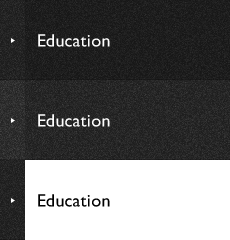Tokyo Institute of Technology provides a Global Scientists and Engineers Course (GSEC) as an educational curriculum, that both undergraduate and graduates students can choose to join, to foster a high sense of internationalism in addition to one's specialization, with the goal of training people who can contribute to the world through global competencies. In the 2020 academic year, about 2,300 students, more than 20% of the entire student body, enrolled in GSEC. These students can get a completion certificate when they graduate if they fulfill the completion requirements which include English-language test score, studying overseas experience and credits earning for selected courses.
The GSEC's mission is to help expand students' international perspectives and develop the abilities required in order to act on a global level. The spread of COVID-19 has limited international travel and thus education overseas, so in order to achieve GSEC's mission, the content and methods of education need to be changed for international exchange to continue.
To achieve this, GSEC has been providing international education since April 2020, thanks to collaboration with overseas partner universities. As it is no longer possible to go overseas to study, a new course to give credit for domestic experience to develop global competencies has been added, and counted as credits following completion of overseas studies. Some of Tokyo Tech's international education initiatives have been carried out for several years now, even before the pandemic. Online international education in the Global Scientists and Engineers Course is broadly divided into three types.
Type |
Partner University |
Outline |
|
Georgia Institute of Technology (Georgia Tech) |
Intensive courses taught by invited a lecturer and a TA from Georgia Tech are now done online |
Chulalongkorn University (CU) |
Hybrid classes that combine two-way visits and remote group work
*Not offered in the 2020 academic year
|
|
Georgia Institute of Technology (Georgia Tech) |
New use of online exchanges in addition to normal classes between the Tokyo Tech and Georgia Tech |
|
Massachusetts Institute of Technology (MIT) |
Online language exchange |
*COVID-19 Information to all stakeholdes of Tokyo Tech is below;
1. Credit-Obtaining Type
Joint Online Classes Offer the Same Quality as Face-to-Face Classes
"Global Leadership Practice" with Georgia Institute of Technology
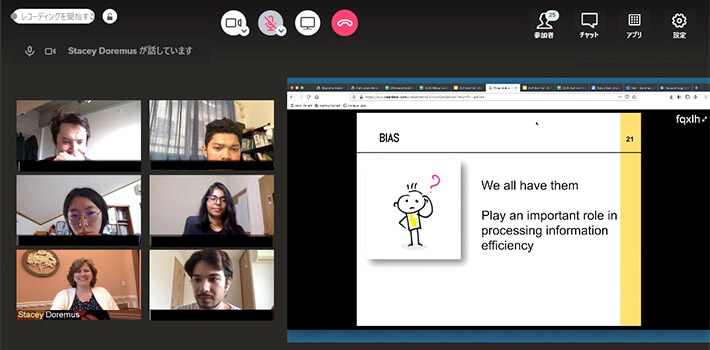
Online Joint Sessions with Georgia Tech
Since the 2018 academic year, Tokyo Tech has been inviting a lecturer and a TA from Georgia Institute of Technology (Georgia Tech) to help lead our joint course Global Leadership Practice. In June 2020, due to the spread of COVID-19 infections, the class was held online. There is a 13-hour time difference between Japan and Atlanta, Georgia, home of Georgia Tech, so the classes started at 8:00 a.m. Japan Time, and 7:00 p.m. Eastern Standard Time.
In addition to explanations by lecturers, this class contains a lot of group work and discussions. To improve their understanding of what they learned during lectures and to encourage further reflection, each student blogged their thoughts and issues from the class. The blog was checked regularly by the lecturers and teaching assistants (TA) both from Georgia Tech and Tokyo Tech, and the content was used to enhance materials in the next class. To draw out opinions from participants, Pear Deck, a platform for presentations that encourages active participation, was used to get visual confirmation of how much students were following the class and how they saw it.
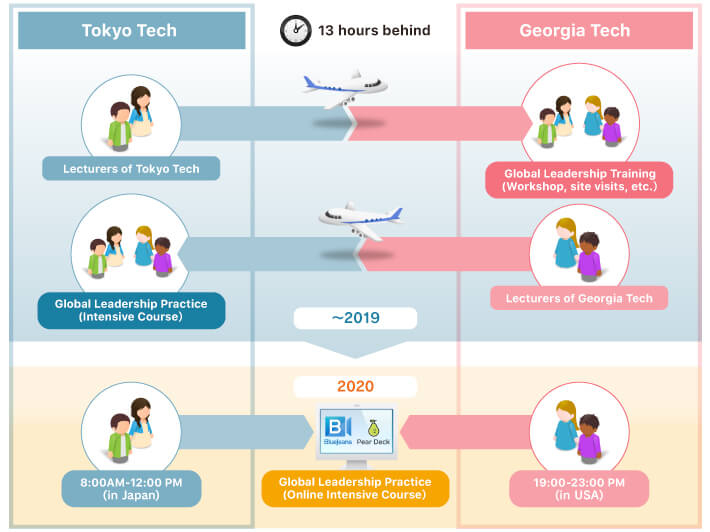
Face-to-Face and Online Classes with Georgia Tech
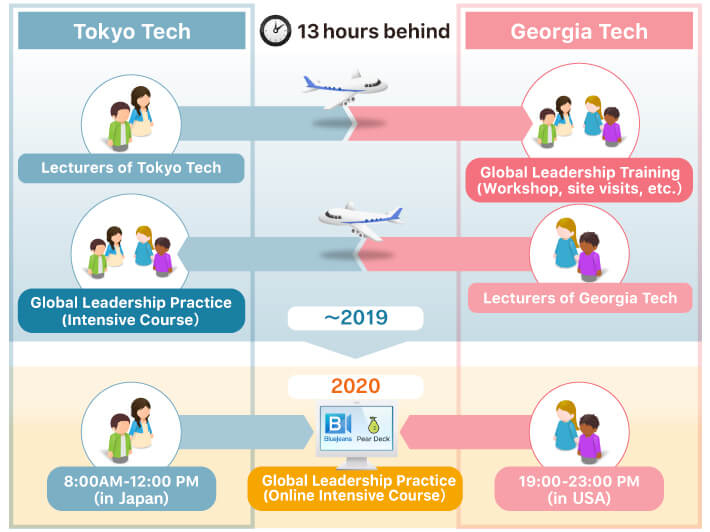
Face-to-Face and Online Classes with Georgia Tech
At one point in these lectures, which teach about leadership, there is an activity in which a hundred cards are used to carry out self-analysis called "value sort" during group work. Classes in previous years used paper cards, but this year, without changing the process or the work of the activity itself, a tool that allowed self-analysis online was programmed and used. Moderators were assigned during the lecture to provide technical support for things like how to use the tool, to monitor students, and so on in order to ensure that the students were able to participate independently.
This course of eight online classes was conducted using a large number of tools and the help of many people to create an experience as similar to being face-to-face as possible. It was a chance for people to learn and grow together beyond national borders, without requiring any travel.
Hybrid Joint Class Incorporates Face-to-Face Visits and Remote Group Work
Problem-Based Learning with Chulalongkorn University in Thailand
Since the 2015 academic year, Tokyo Tech, together with Chulalongkorn University in Thailand, has offered multicultural problem-based learning (PBL) courses that incorporate online communication. In 2020, they were suspended since site visits in Japan and Thailand were no longer possible. However, the Institute was able to apply its accumulated expertise and experience in international cooperative learning to other areas.
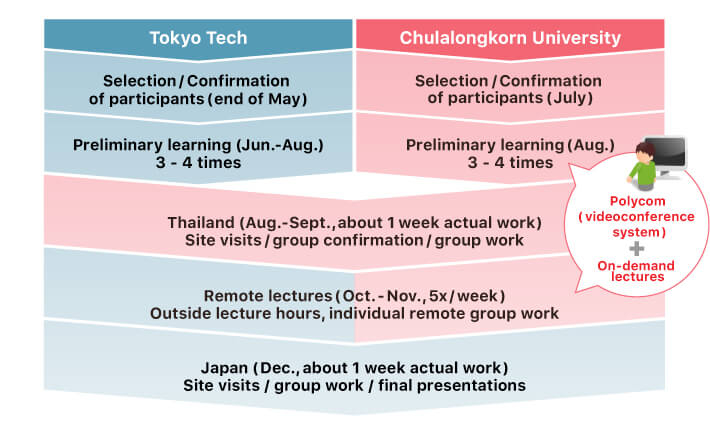
Joint Class Flow
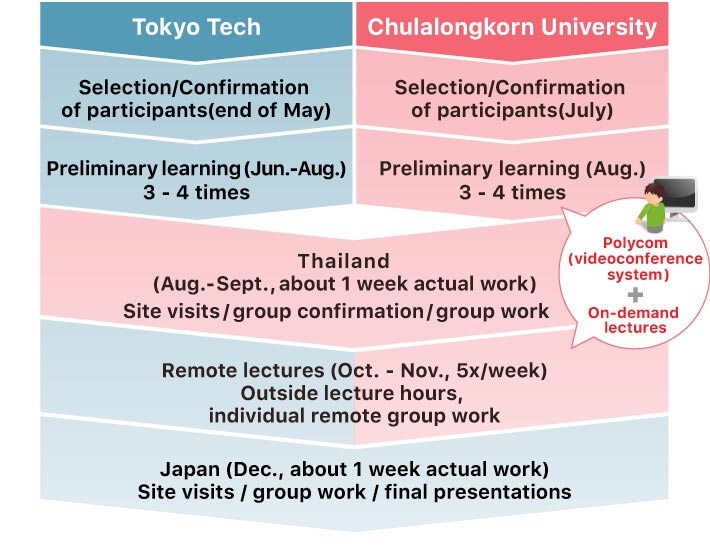
Joint Class Flow
The course lasts for about half a year. After preliminary study and online exchange between students of both countries, Tokyo Tech students visit Thailand, take part in classes there, visit research institutes, companies, and government organizations, and carry out group work alongside students from Chulalongkorn University.
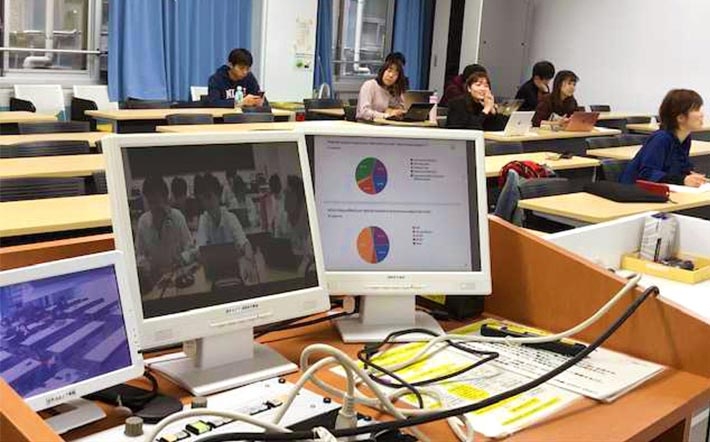
Remote classes with Chulalongkorn University in Thailand
After returning to Japan, the Tokyo Tech students take part in five online remote classes/group work sessions with students from both universities. Remote classes are held using the Polycom video-conferencing system, with both classrooms showing on each student's screen, so it is almost like taking the class in the same space. In addition, a part of the specialized lectures are filmed by Tokyo Tech's Online Education Development Office (OEDO), allowing on-demand learning.
To deepen group discussion, assignments are given to students regularly. Students talk online with each other outside lecture hours, and report their conclusions during the next class. Sharing information among students outside lectures is done through social media apps and online storage services the students themselves are familiar with, and chats and other methods are used in addition to voice tools. Additionally, Facebook groups have been used ever since the Multicultural PBL courses started, and these are used for reminding students about assignments, comments on group work, and sharing lectures and showing what sites have been visited by both universities. Through these Multicultural PBL courses, students learn the effectiveness of selecting the most appropriate tools when communication methods differ by country or person, and make great strides in learning about international cooperation.
Following the online joint work after about two months, the Tokyo Tech students are glad to see their Chulalongkorn University in person when they come to Japan. Together, they visit a range of sites in Japan and finish off their group work before making their final presentations.
Student awareness surveys taken over the past four courses have shown that many participants feel that their own skills have improved after completing the program.
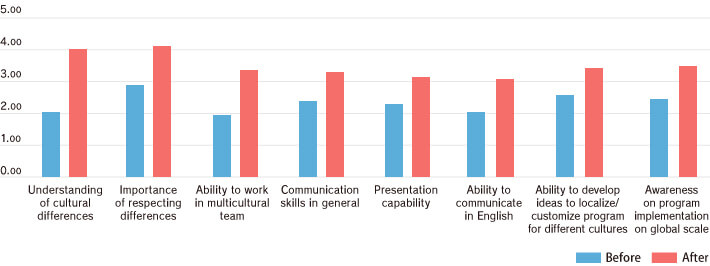
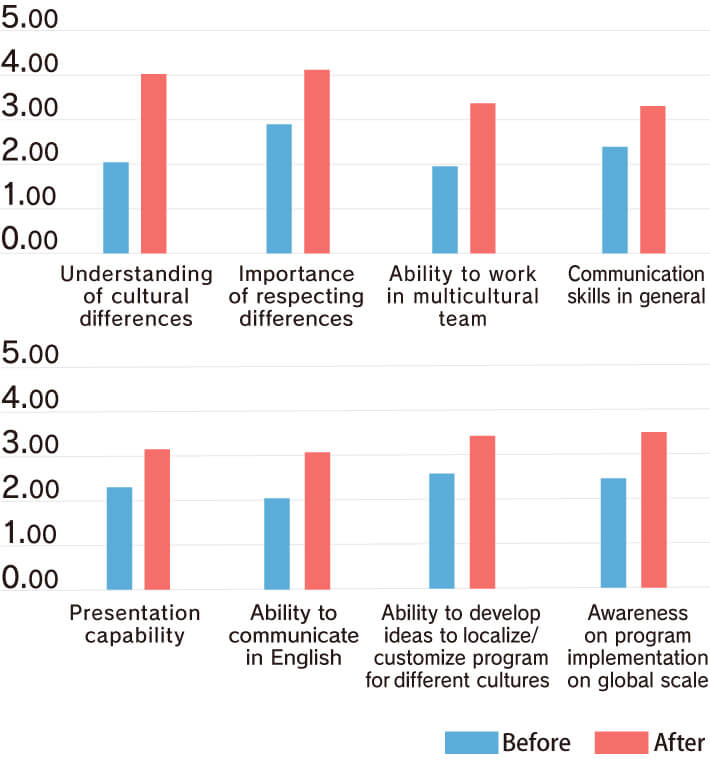
Changes in Awareness Before and After the Program (Surveys from the academic years 2016-2019)
(Targets: 34 Tokyo Tech students in total. Based on a 5-point scale)
2. Inter-Class Exchange Types
Online Student Exchange Events Based on Existing Lecture Content
Joint Sessions with Georgia Institute of Technology on Cross-Cultural Understanding
To construct new joint classes with partner universities overseas takes a lot of coordination and effort. However, creating an opportunity for online exchange based on existing lecture content between two universities can be done relatively fast, and it is an effective form of international collaboration.
In September 2020, Tokyo Tech and Georgia Tech held a joint session as a chance to deepen one's learning of individual classes. TAs and students taking Tokyo Tech courses such as Multicultural Collaboration and Leadership and Georgia Tech's Foundations of Leadership course were recruited for the joint session. The purpose was to compare the cultural characteristics of each country and each person's own behavioral characteristics in order to understand how to carry out joint work cross-culturally and learn about team-building in other cultures.
Participants were given a questionnaire on how to carry out joint work cross-culturally beforehand. Looking back on the group work they experienced with each university in the joint session, they compared differences. After the session, they submitted essays about their individual learning and impressions that could be used for subsequent opportunities.
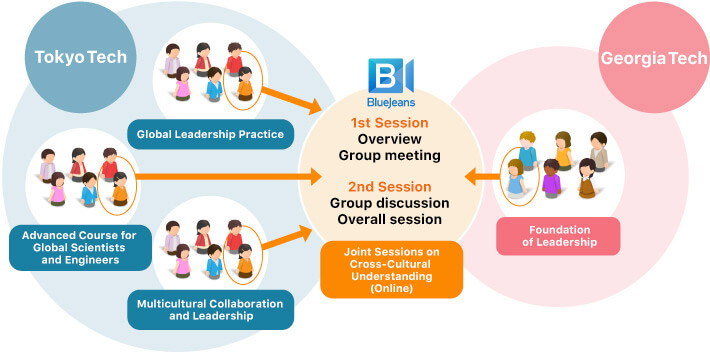
Flow of Online Joint Session
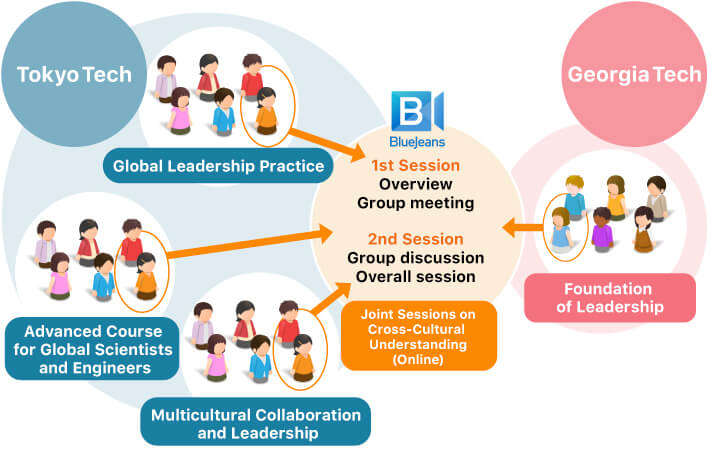
Flow of Online Joint Session
3. Student Exchange Type
Language Exchange Online
Aiming for multicultural understanding and improved linguistic skills online with MIT students
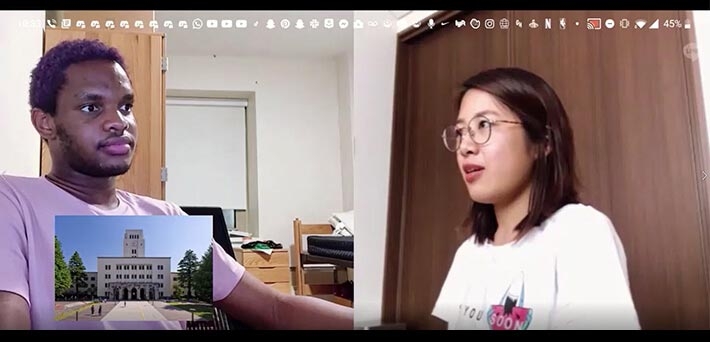
Discussing various differences between Japan and US
For one month, from June to July 2020, study from home continued following the lifting of Japan's emergency declaration in May, Tokyo Tech students connected online with students from the Massachusetts Institute of Technology (MIT) for language exchange. This involves two people with different native languages learning the partner's language and understanding their cultures.
Pairs were assigned randomly. In each session, students spoke in Japanese for 30 minutes and in English for 30 minutes. Each pair coordinated their schedules for subsequent meetings. Online tools convenient for both sides were also used for communication.
Participants could select their own topics for discussion. Some of the topics selected were comparisons between educational systems and university curriculums in Japan and the USA, understanding culture in terms of food, folk tales, sports, movies, music, linguistics, television programs, and translations of movie titles. Through this range of topics, students were not only able to improve their language skills, but broaden their perspectives regarding multicultural understanding.
Finally, each pair created a five-minute video in which they summarized their discussions. Drawing on the cooperation skills they fostered through talking to each other, they completed their videos through remote work. A video contest was held in which everyone viewed the videos of the other pairs, shared thoughts on each pair's topics, and learned about the results of their discussions.
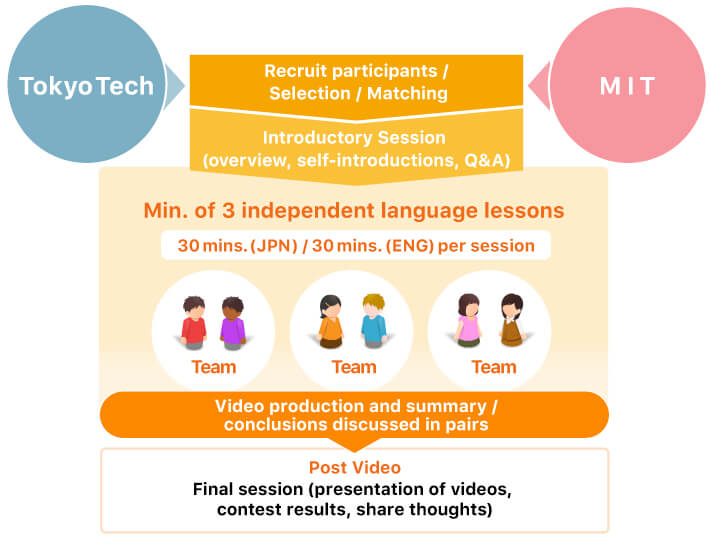
Flow of Online Language Exchange
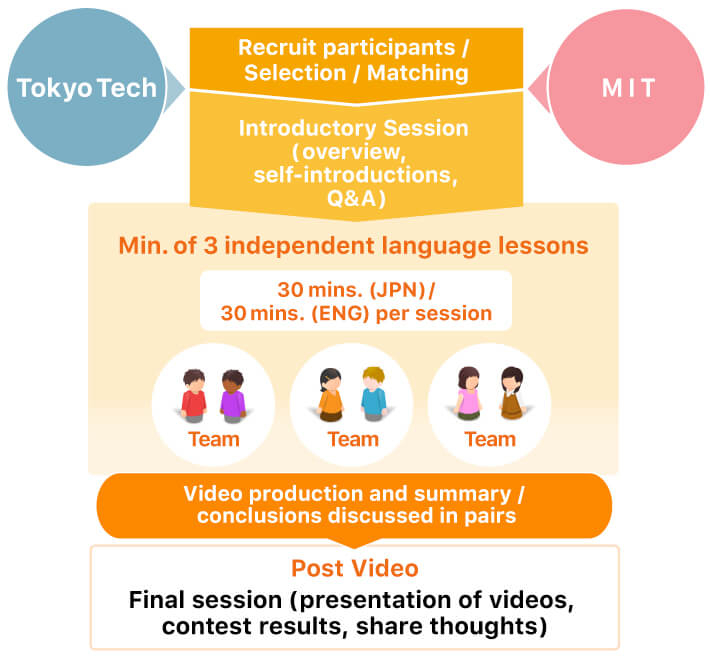
Flow of Online Language Exchange
Comments from students/participants:
"Normally, I wouldn't have taken part in this event because the hurdles seemed to be too high. But when I heard I would be able to talk with MIT students easily online, I could make the decision to take part."
"I enjoyed talking with my new friend. I didn't learn just English vocab, but also about American culture and lifestyles. This led me to be even more interested in America and MIT."
For Tokyo Tech students, this was an opportunity to make new friends with MIT students while still at home in Japan, and build strong relationships. Many of the students expressed a desire to meet in person by visiting Japan or the United States. Students in the MIT-Japan Program would normally have visited Japan in the summer of 2020 to take part in the Tatara Steelmaking Workshop, put on by the Global Scientists and Engineers Course. However, as this was not possible, online language exchange became a good chance for Tokyo Tech and MIT students to interact.
One of the organizers on the MIT commented that "When watching our students final project videos, I was so moved and touched by their creativity and passion to learn each other's culture and language. I taught many of the MIT participants "in-person" in the past, and it was such a rewarding experience for me to see their "happy and energetic" faces, using the Japanese language at this difficult time. I also want to point out that this program was pedagogically well-designed, and we language teachers have learned a lot from this experience."
Enhancing International Education Through Online International Exchange and Overseas Travel
Once we finally emerge into a post-COVID world, it is likely for safety reasons that international exchange regardless of travel will be a new standard for international education. As the example of joint classes with Chulalongkorn University showed, a hybrid form that combines online exchange with foreign travel is also effective in terms of international education.
Tokyo Tech will continue to work on a range of initiatives in its Global Scientists and Engineers Course and -- once the situation has returned to what it was before this pandemic -- will draw on its experiences to provide even better quality of international education.
The Special Topics component of the Tokyo Tech Website shines a spotlight on recent developments in research and education, achievements of its community members, and special events and news from the Institute.
Past features can be viewed in the Special Topics Gallery.
. Any information published on this site will be valid in relation to Science Tokyo.


















